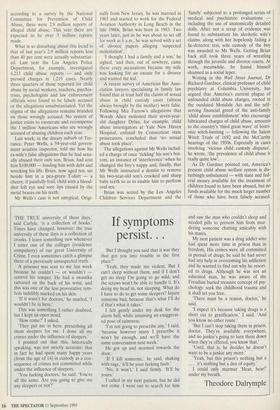If symptoms
persist.. .
THE TRUE university of these days,' said Carlyle, 'is a collection of books.' Times have changed, however: the true university of these days is a collection of crooks. I learn something new whenever I enter one of the colleges (residence compulsory) of our great University of Crime. I even sometimes catch a glimpse there of a previously unsuspected truth.
A prisoner was sent to me last week because he couldn't — or wouldn't control his temper. He had a swastika tattooed on the back of his wrist, and this was one of the less provocative sym- bols indelibly marked on his skin.
`If it wasn't for doctors,' he snarled, 'I wouldn't be in here.'
This was something I rather doubted, but I kept an open mind.
`How come?' I asked.
`They put me in here, prescribing all them sleepers for me. I done all my crimes under the influence of sleepers.'
I pointed out that this, historically speaking, was not strictly accurate: that in fact he had spent many happy years (from the age of 14) in custody as a con- sequence of crimes not committed while under the influence of sleepers.
`You fucking doctors,' he said. 'You're all the same. Are you going to give me any sleepers or not?' `But I thought you said that it was they that got you into trouble in the first place?' `Yeah, they made me violent. But I can't sleep without them, and if I don't get no sleep I'm going to go wild, and the screws won't be able to handle it. It's doing my head in, not sleeping. What do I have to do to get some sleepers? Injure someone bad, because that's what I'll do if that's what it takes.'
I felt gently under my desk for the alarm bell, while assuming an exaggerat- ed pose of calmness. `I'm not going to prescribe any,' I said, `because however many I prescribe it won't be enough, and we'll have the same conversation next week.'
He got up and stormed towards the door.
`If I kill someone,' he said, shaking with rage, 'it'll be your fucking fault.'
`No, it won't,' I said firmly. 'It'll be yours.'
I called in my next patient, but he did not come. I went out to search for him and saw the man who couldn't sleep and needed pills to prevent him from mur- dering someone chatting amicably with his mates.
My next patient was a drug addict who had spent more time in prison than in freedom. His crimes were all committed in pursuit of drugs; he said he had never had any help in overcoming his addiction and he wanted to find out why he resort- ed to drugs. Although he was not an educated man, he was aware of the Freudian buried treasure concept of psy- chology: seek the childhood trauma and it shall set you free.
`There must be a reason, doctor,' he said.
`I expect it's because taking drugs is a short cut to gratification,' I said. 'And you know no other route.'
`But I can't stop taking them in prison, doctor. They're available everywhere, and no junkie's going to turn them down when they're offered, you know that.'
`Until, that is, he decides he doesn't want to be a junkie any more.'
`Yeah, but this prison's nothing but a . . . it's nothing but a den of equity.'
I could only murmur 'Hear, hear!' under my breath.
Theodore Dalrymple


















































 Previous page
Previous page